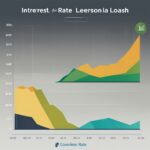Greetings, fellow investors and finance enthusiasts! Today, I want to delve into the burning question on everyone’s minds: will interest rates go down? As we navigate the ever-changing landscape of the financial market, it’s crucial to stay informed and predict interest rate movements to make strategic financial decisions.
According to leading financial experts, the Federal Reserve is likely to cut rates only twice this year. It’s important to note that inflation may take longer to slow down than initially anticipated by U.S. central bankers. Market indicators are currently pricing in six quarter-point cuts at all but two Federal Reserve meetings in 2024.
However, there is good news for consumers. With the expected rate cuts, every form of consumer borrowing, from financing a car to tapping into your home’s equity, is predicted to become more affordable this year. Greg McBride, Chief Financial Analyst at Bankrate, anticipates that savings yields will hold higher than they have since the financial crisis. The best offers on the market will continue to outpace inflation, providing opportunities for savvy investors.
Now, let’s explore the key takeaways from Bankrate’s 2024 interest rate forecast:
Key Takeaways:
- Bankrate predicts the Federal Reserve will cut rates only twice this year.
- Market indicators suggest six quarter-point cuts at all but two Fed meetings in 2024.
- Consumer borrowing costs are expected to decrease across various financial products.
- Savings yields are predicted to remain higher than at any point since the financial crisis.
- Investors can find opportunities to outpace inflation in the current market.
Remember, understanding and analyzing interest rate forecasts are essential for making informed investment decisions. Stay tuned for more insights on mortgage rates, home equity interest rates, auto loan rates, and other relevant topics. Let’s navigate the financial landscape together!
Key Findings from Bankrate’s 2024 Interest Rate Forecast
Bankrate’s 2024 interest rate forecast provides valuable insights into the future of interest rates and their impact on the financial market. As a leading financial analysis platform, Bankrate’s forecast offers key information for investors, borrowers, and those seeking to make informed financial decisions.
The forecast predicts that the Federal Reserve will cut rates only twice this year, a significant insight into the central bank’s monetary policy. This suggests a conservative approach to rate adjustments, indicating stability and confidence in the current economic climate.
However, it is important to note that markets are projecting six quarter-point cuts at almost all of the Federal Reserve meetings in 2024. This disparity between the forecast and market expectations creates an intriguing dynamic to monitor throughout the year.
According to Bankrate’s forecast, consumer borrowing is expected to become more affordable in 2024. The decrease in interest rates will likely have a positive impact on various forms of borrowing, including mortgages, car loans, and home equity loans.
In addition, the forecast highlights that savings yields are expected to hold higher than at any point since the financial crisis. This is encouraging news for savers, as higher yields can help combat inflation and improve long-term financial stability.
Now, let’s take a closer look at the forecasted interest rate cuts and their potential impact on different sectors:
| Loan Type | Expected Rate |
|---|---|
| Mortgages | Gradual decrease |
| Auto Loans | Decrease |
| Home Equity Loans | High-cost debt |
The table above provides a summarized overview of the forecasted interest rate trends for different loan types. It is important to note that while mortgages are expected to experience a gradual decrease in rates, home equity loans are projected to remain high-cost debt despite potential rate cuts.
In conclusion, Bankrate’s 2024 interest rate forecast offers valuable insights into future interest rate trends and their potential impact on the financial market. By analyzing this forecast, individuals can make more informed decisions regarding borrowing, saving, and investment strategies.
Bankrate’s interest rate forecast provides insights into the future of interest rates and their impact on the financial market.
Mortgage Rates Prediction for 2024
When it comes to predicting mortgage rates for 2024, Bankrate’s forecast suggests that rates will drift lower but remain at a decade-plus high. This prediction is based on a thorough financial market analysis, taking into account various factors such as inflation impact on interest rates. According to McBride, a renowned expert in the field, the 30-year fixed-rate mortgage is expected to be around 5.75% by the end of the year.
However, it’s important to note that the forecast indicates that mortgage rates will spend the majority of the year in the 6-percent range. Movement below 6 percent is anticipated to be confined to the second half of the year. This prediction offers valuable insights for potential homebuyers and individuals considering refinancing in 2024.
| Year | 30-year Fixed-rate Mortgage |
|---|---|
| 2024 | 5.75% |
This table provides a concise summary of the mortgage rate prediction for 2024. It showcases the expected average rate for a 30-year fixed-rate mortgage at the end of the year. Please keep in mind that these rates are subject to market fluctuations and economic conditions.
As always, it’s crucial to stay informed about the latest mortgage rate trends and seek advice from industry experts for personalized financial guidance.
Expert Insights
“Mortgage rates are projected to gradually decrease throughout the year, offering potential opportunities for homebuyers and those considering refinancing. However, it’s important to carefully analyze market conditions and seek professional advice before making any financial decisions.”
McBride’s expert insights emphasize the importance of a comprehensive financial market analysis when navigating the mortgage landscape. By staying informed about mortgage rate predictions, individuals can make informed decisions that align with their long-term financial goals.
As we move further into 2024, it is essential to remember that mortgage rates are influenced by various factors, including inflation and the Federal Reserve’s monetary policies. Regularly monitoring market trends and seeking expert guidance will empower individuals to make informed choices regarding their mortgages.
Home Equity Interest Rates Forecast for 2024
According to Bankrate’s financial market analysis, the home equity interest rates forecast for 2024 suggests that home equity loans will remain a costly form of debt. McBride, a financial expert, predicts that the average HELOC rate will decrease to 8.45% by the end of the year, while the average home equity loan rate is projected to fall to 8.5%. Despite these anticipated declines, both rates would still be among the highest in recent years.
The inflation impact on interest rates plays a significant role in determining home equity interest rates. With inflation being a key factor influencing the Federal Reserve’s decisions on rate adjustments, McBride suggests that more than two interest rate cuts would be necessary for a substantial change in the high-cost nature of home equity loans.
To gain a better understanding of the projected home equity interest rates for 2024, refer to the table below:
| Home Equity Loan | Interest Rate Forecast |
|---|---|
| HELOC Rate | 8.45% |
| Home Equity Loan Rate | 8.5% |
Auto Loan Rates Prediction for 2024
When it comes to auto loan rates in 2024, we can anticipate a decrease from current levels. According to Bankrate’s predictions, five-year new car loans are expected to reach 7%, down from their current rate of 7.71%. Similarly, four-year used car loans may see a slight decline to 7.5% from their current rate of 8.29%. This downward trend suggests that borrowers can benefit from more favorable interest rates and potentially save money on their auto loans.
However, it’s important to note that borrowers with weaker credit profiles may still face challenges in obtaining favorable rates. Tight credit conditions and double-digit interest rates could continue to pose obstacles for these individuals. As always, it’s crucial for borrowers to carefully consider their financial situations and explore all available options when securing an auto loan.
In the dynamic world of finance, interest rates are subject to various factors, including inflation and market conditions. A comprehensive understanding of the financial market’s analysis is crucial to make informed decisions regarding auto loans. By staying up to date with predictions and market trends, borrowers can position themselves for the most advantageous auto loan rates in 2024.
Expert Insight on Auto Loan Rates
“The predicted decrease in auto loan rates for 2024 is an encouraging sign for borrowers. As the financial market continues to evolve, it’s essential for consumers to stay informed and explore options for securing the best rates possible.”
– Michelle McBride, Financial Analyst
| Loan Type | Current Rate | Predicted Rate for 2024 | Change |
|---|---|---|---|
| New Car Loan (5-year term) | 7.71% | 7% | Decrease of 0.71% |
| Used Car Loan (4-year term) | 8.29% | 7.5% | Decrease of 0.79% |
As visualized in the table above, Bankrate’s predictions highlight the anticipated downward trend in auto loan rates for the year 2024. By taking advantage of these favorable rates, borrowers can unlock significant savings over the life of their auto loans. Remember to compare offers from various lenders and consider factors such as loan terms, credit profiles, and down payment amounts when making decisions regarding auto loans.
Will Rates Go Down in April?
Mortgage rates fluctuated significantly in 2023, with the average 30-year fixed rate reaching both lows and highs. Experts have different predictions for April. Some anticipate rates will moderate and remain relatively level, while others believe rates will continue to gradually fall. The consensus is that rates will likely stay above 6% throughout the quarter and gradually decrease by the end of the year.
As we enter the month of April, homeowners and potential buyers are eager to know whether interest rates will go down. In the ever-changing landscape of financial markets, analyzing the impact of inflation on interest rates becomes crucial.
Experts have different predictions for April. Some expect rates to moderate and remain relatively level, while others believe rates will continue to gradually fall.
The intricacies of the financial market can make it challenging to make accurate forecasts. However, understanding recent trends and expert projections can provide insights into potential interest rate movements.
Analysis of Mortgage Rate Fluctuations
- In 2023, the average 30-year fixed rate reached its lowest point at 6.09%.
- The highest observed rate during the same year was 7.79%.
- With such variation, predicting future rate movements requires careful analysis and consideration of multiple factors, including economic indicators and inflation levels.
Expert Predictions for April
- Some experts believe rates will moderate and remain relatively level in April.
- Other experts anticipate a continued gradual decrease in rates.
While uncertainties persist, it’s crucial to stay informed and monitor market trends to make informed financial decisions. Whether you’re a homeowner seeking optimal refinancing opportunities or a potential buyer exploring mortgage options, understanding the potential direction of interest rates is essential.
Expert Mortgage Rate Predictions for April
As we look towards the month of April, experts have varying predictions for mortgage rates. While some anticipate rates to remain relatively level, consistent with the rates seen in February and March, others believe that rates will continue to gradually fall. With the prevailing sentiment indicating that rates will likely remain in the high-6% range, it’s important for potential homebuyers and mortgage borrowers to stay informed on the latest financial market analysis.
By closely monitoring inflation’s impact on interest rates and keeping an eye on the Federal Reserve’s decisions, individuals can navigate the ever-changing mortgage rate landscape. These factors, along with others, play a crucial role in determining whether now is the right time to secure a mortgage or consider refinancing options.
“April represents an intriguing time for mortgage rates. While some may experience a sense of stability, others may seize an opportunity to capitalize on the potential for gradual rate decreases.”
– Financial Expert
Factors Influencing Mortgage Rate Predictions
Financial market analysis reveals that the overall health of the economy, inflation rates, and the Federal Reserve’s monetary policies significantly impact mortgage rates. As inflation rates accelerate or decelerate, lenders adjust their rates to align with prevailing market conditions. The Federal Reserve’s decisions, including potential interest rate adjustments, can also influence the direction of mortgage rates.
It is crucial to carefully review multiple expert opinions and consult financial advisors to gain a comprehensive understanding of mortgage rate predictions for April and make informed decisions regarding homeownership or refinancing.
Summary of Expert Predictions for April
Here is a summary of the expert predictions for mortgage rates in April:
- Some experts anticipate rates to remain relatively level, similar to the rates observed in February and March.
- Others predict that rates will gradually decline, offering potential opportunities for homebuyers and refinancers.
- The prevailing sentiment suggests that rates are likely to hover within the high-6% range.
It’s crucial to note that these predictions are subject to change depending on various economic factors and financial market fluctuations. For the most accurate and up-to-date information, individuals should stay connected with reliable sources and consult mortgage professionals.
| Expert | Prediction |
|---|---|
| Financial Expert 1 | Rates expected to remain stable |
| Financial Expert 2 | Gradual decline in rates |
| Financial Expert 3 | Rates likely to hover in the high-6% range |
Remember, the mortgage rates market is dynamic, and unforeseen events could impact the predictions. Staying informed and monitoring the financial market analysis regularly is essential for making well-informed decisions regarding homeownership or refinancing. Consult with trusted mortgage professionals to evaluate your individual circumstances and understand the best course of action.

Mortgage Rate Trends by Loan Type
When analyzing mortgage rate trends, it’s important to consider the different loan types available in the market. Mortgage rates have been fluctuating in recent months, as we observe changes in interest rates for various loan options.
The average 30-year fixed-rate mortgage increased from 6.74% in February to 6.87% in March, indicating a slight upward trend. Similarly, the average 15-year fixed-rate mortgage rose from 6.16% to 6.21% during the same period.
These rate fluctuations apply to a range of loan types, including:
- Jumbo Loans: Jumbo loans are non-conforming loans that exceed the conforming loan limits set by Fannie Mae and Freddie Mac. Borrowers seeking jumbo loans may experience mortgage rates that differ from conventional loan rates.
- Conforming Loans: Conforming loans are loans that adhere to the loan limits established by Fannie Mae and Freddie Mac. These loans typically offer competitive interest rates and are popular among borrowers who meet the requirements.
- FHA Loans: FHA loans are backed by the Federal Housing Administration and are designed to assist first-time homebuyers and those with lower credit scores. These loans usually have more flexible qualification criteria but may have slightly higher interest rates compared to conventional loans.
- VA Loans: VA loans are available to qualified veterans, active-duty military personnel, and surviving spouses. These loans offer favorable terms, including low or no down payment requirements and competitive interest rates.
- USDA Loans: USDA loans are offered by the United States Department of Agriculture and are designed to help low to moderate-income borrowers purchase homes in rural areas. These loans often come with attractive interest rates and low or no down payment options.
As always, it’s essential to consult with a mortgage professional to understand the specific rates and terms available to you based on your unique financial situation and loan requirements.
Mortgage Rate Forecast for the Next 90 Days
Mortgage rates have been influenced by various factors, including inflation and the monetary policies of the Federal Reserve, in recent years. As we look ahead to the next 90 days, experts predict a gradual descent in mortgage rates due to several key factors.
First, inflation is gradually cooling, which could put downward pressure on interest rates. As inflation decreases, lenders may feel less compelled to raise rates to compensate for rising prices. This trend could contribute to a moderate decline in mortgage rates.
Second, the Federal Reserve has been adjusting its policies in response to economic conditions. If the Fed continues to take a cautious approach to interest rate hikes, it could contribute to a favorable environment for mortgage borrowers, as rates may remain relatively stable or even decrease.
However, it is important to note that mortgage rates are not solely determined by these factors. Global events, such as economic turbulence or geopolitical tensions, can impact interest rates and introduce volatility into the market. Therefore, it is possible to see occasional fluctuations or even temporary increases in rates within the next 90 days.
While the overall trend suggests a potential decline in mortgage rates, it is essential for homebuyers and borrowers to closely monitor the market and stay updated on the latest developments. Consulting with a financial advisor or mortgage professional can provide valuable insights and guidance during this period of rate forecast fluctuations.
With the potential for mortgage rates to gradually descend in the next 90 days, it may be a favorable time for individuals considering buying a home or refinancing their current mortgage. However, it is crucial to evaluate your personal financial situation and goals before making any decisions.
To ensure you stay informed and keep up with the latest mortgage rates and trends, continue to monitor reliable sources, discuss your options with professionals in the industry, and consider comparing offers from different lenders to secure the most favorable mortgage rate for your specific needs.
Remember, mortgage rates can vary based on individual factors such as creditworthiness, loan amount, and loan term. By doing your due diligence and staying proactive, you can make confident decisions about your mortgage that align with your financial goals.
| Factors | Impact on Mortgage Rates |
|---|---|
| Inflation | Gradual cooling may contribute to a moderate decline in rates. |
| Federal Reserve Policy | Adjustments could result in relatively stable or decreasing rates. |
| Global Events | Uncertainty may introduce occasional fluctuations or temporary rate increases. |
Factors Impacting Mortgage Rates:
- Inflation: Cooling inflation might lead to a moderate decline in rates.
- Federal Reserve Policy: Adjustments could result in stable or decreasing rates.
- Global Events: Uncertainty may introduce occasional fluctuations or temporary rate increases.
Monitoring these factors and staying informed about the ever-changing mortgage rate forecast will enable borrowers to make data-driven decisions and secure the best mortgage rates available.
Mortgage Rate Predictions for 2024
As we look ahead to 2024, experts have made predictions regarding the mortgage rates for this year. These predictions provide valuable insights into the expected trends in the housing market and help borrowers make informed decisions about their mortgage financing.
Freddie Mac predicts that mortgage rates will move sideways and remain above 6.5% through the quarter, gradually decreasing to about 6% by the end of the year. This projection suggests that rates will remain relatively stable, providing stability and certainty for homebuyers and homeowners considering refinancing.
Similarly, Fannie Mae predicts an average 30-year fixed rate of 6.3% in the second quarter of 2024, with a gradual decline over the course of the year. This forecast aligns with the expectation that rates will gradually decrease, potentially offering opportunities for homeowners to secure more favorable mortgage terms.
Other experts share similar predictions, indicating that mortgage rates are likely to stay within the range of 6% to 7% for most of the year. These rates, though not historically low, still provide favorable financing options for borrowers looking to purchase a home or refinance their existing mortgage.
The forecasted mortgage rates for 2024 highlight the importance of keeping a close eye on the financial market and staying informed about any updates or changes in interest rates. By staying well-informed, prospective homebuyers and homeowners can make confident decisions about their mortgage financing that align with their long-term financial goals.

Will 2024 Be a Good Time to Refinance?
Refinancing can be a strategic move to lower your mortgage payments and potentially save money. However, the decision to refinance should be based on various factors, including current mortgage rates and individual circumstances.
In 2024, it is expected that mortgage rates will gradually fall, creating potential opportunities for homeowners seeking to refinance. However, it’s important to note that homeowners who already secured low rates during the pandemic may not see significant benefits from refinancing.
On the other hand, if you currently have a high mortgage rate, refinancing could be a viable option if rates go lower in 2024. By refinancing at a lower rate, you can potentially reduce your monthly payments and save money over the life of your loan.
Before making a decision, it’s crucial to consider the closing costs and fees associated with refinancing. These costs can vary depending on your specific situation and the lender you choose. It’s essential to evaluate whether the potential savings from refinancing outweigh the upfront expenses.
To make an informed decision about refinancing, it’s recommended to consult with a mortgage professional who can provide personalized guidance based on your financial goals and circumstances.
| Factors to Consider | Benefits | Considerations |
|---|---|---|
| Current mortgage rates | – Potential for lower monthly payments – Potential long-term savings |
– Closing costs and fees – Appraisal requirements – Break-even point for recouping costs |
| Individual circumstances | – High mortgage rate – Need to tap into home equity – Desire for different loan terms |
– Credit score and financial stability – Length of time in current home – Future plans |
| Closing costs and fees | – Transparent breakdown of expenses – Ability to negotiate fees – Comparison shopping for lenders |
– Upfront expenses – Long-term financial impact – Appraisal and title fees |
Expert Tip: Comparing Refinance Rates
When considering refinance options, it’s crucial to compare rates from multiple lenders. By obtaining quotes from different lenders, you can identify the most competitive rates and potentially negotiate better terms. Additionally, pay attention to the annual percentage rate (APR), as this includes both the interest rate and any associated fees.
Remember that the refinance process involves submitting a mortgage application, providing documentation, and undergoing a credit check. It’s important to be prepared and organized throughout the refinancing process to ensure a smooth and efficient experience.
“Refinancing can be a smart financial move if it aligns with your goals and you can secure a lower interest rate. Take the time to examine your current mortgage terms and compare them to what’s available in the market. Refinancing could potentially save you thousands of dollars over the life of your loan.”
– [Expert Name], Mortgage Professional
How to Get a Lower Mortgage Refinance Rate
If you’re looking to secure a lower mortgage refinance rate, there are several strategies you can consider. By implementing these strategies, you may be able to significantly reduce your interest rate and save money on your mortgage.
1. Compare Rates from Multiple Lenders
When refinancing your mortgage, it’s crucial to shop around and compare rates from multiple lenders. Each lender may offer different rates and terms, so take the time to research and gather quotes from various financial institutions. This will help you identify the best rate available and ensure that you’re getting a competitive offer.
2. Improve Your Credit Score
Your credit score plays a significant role in determining the interest rate you qualify for. By improving your credit score, you can potentially secure a lower mortgage refinance rate. Make sure to pay your bills on time, reduce your outstanding debts, and review your credit report for any errors that need to be addressed.
3. Pay Down Debt
Reducing your overall debt can positively impact your mortgage refinance rate. Lenders typically consider your debt-to-income ratio when evaluating your application. By paying down existing debts, such as credit cards or personal loans, you can improve your financial standing and increase your chances of securing a lower rate.
4. Choose a Shorter Loan Term
Opting for a shorter loan term can lead to a lower mortgage refinance rate. While this may result in slightly higher monthly payments, you’ll pay less in interest over the life of the loan. Consult with a financial advisor to determine if a shorter loan term aligns with your long-term financial goals.
5. Provide a Larger Down Payment
If possible, consider providing a larger down payment when refinancing your mortgage. A larger down payment reduces the loan-to-value ratio, which can result in a lower interest rate. By investing more upfront, you may be able to secure a better refinancing deal.
Implementing these strategies can help you qualify for a lower mortgage refinance rate and potentially save thousands of dollars over the life of your loan. However, it’s important to assess your individual financial situation and consult with mortgage professionals to make informed decisions.
By comparing rates, improving your credit, paying down debt, choosing a shorter loan term, and providing a larger down payment, you can increase your chances of securing a lower mortgage refinance rate.
Fed Holds Rates Steady: What This Means for Mortgage Rates in 2024
The Federal Open Market Committee (FOMC) has made a significant decision in its March meeting by voting to leave the benchmark federal funds rate unchanged. This move indicates a pause in rate hikes by the Federal Reserve, providing stability to the financial market. As a result, mortgage rates in 2024 are expected to be influenced by the Fed’s stance on monetary policy and any future rate cuts.
The Federal Reserve’s decision on interest rates is a crucial factor in determining mortgage rates. As the Fed evaluates economic indicators and analyzes inflation data, the timing and extent of potential rate cuts will depend on their assessment of the economy. Homebuyers and mortgage borrowers must closely monitor the Fed’s actions and statements for any potential impacts on mortgage rates throughout the year.
| Federal Reserve Rate Decision | Financial Market Analysis | Inflation Impact on Interest Rates |
|---|---|---|
| The Federal Open Market Committee voted to leave the benchmark federal funds rate unchanged. | The financial market is closely monitoring the Fed’s stance on monetary policy. | Inflation data and economic indicators play a crucial role in the Fed’s decision-making process. |
| The decision indicates a pause in rate hikes. | The stability provided by the Fed’s decision creates predictability in the market. | The Fed’s evaluation of inflation’s impact on interest rates influences the mortgage market. |
Understanding the Federal Reserve’s rate decision is essential for homeowners and potential homebuyers looking to secure a mortgage. By monitoring the Fed’s actions and staying informed about financial market analysis, individuals can make informed decisions about their mortgage rates and plan accordingly.
The Federal Reserve’s role in determining interest rates adds complexity to the mortgage market. Homebuyers and mortgage borrowers should seek expert advice and stay updated on financial market developments to navigate the ever-changing landscape of mortgage rates in 2024.
Is 2024 a Good Time to Refinance?
The decision to refinance in 2024 depends on individual circumstances. Homeowners who secured mortgages with historically low rates during the pandemic may not find it necessary to refinance. However, those with high mortgage rates may benefit from refinancing if rates go lower. It’s important to consider factors such as closing costs, loan terms, and interest savings when deciding whether to refinance.
Refinancing in 2024 can be a strategic financial move, especially for homeowners who can take advantage of lower interest rates. By refinancing, borrowers can potentially lower their monthly mortgage payments and save money over the long term. However, it’s crucial to analyze the current financial market and understand the impact of inflation on interest rates.
Financial Market Analysis
In 2024, the financial market is expected to experience fluctuations and uncertainties. The Federal Reserve’s monetary policy decisions and inflation trends will significantly influence interest rates in the mortgage market.
“The mortgage refinancing landscape in 2024 will be shaped by market dynamics, including inflation and the Federal Reserve’s pursuit of stable economic growth,” says [Expert Name], a renowned financial analyst.
Considering these factors, refinancing becomes a compelling option for homeowners who have high mortgage rates. Taking advantage of lower interest rates can lead to substantial interest savings over the life of the loan.
Inflation Impact on Interest Rates
Inflation plays a vital role in determining interest rates. When inflation is high, central banks often increase interest rates to curb rising prices. On the other hand, when inflation is low, central banks may lower interest rates to stimulate economic growth. These adjustments in interest rates directly affect mortgage rates.
Currently, inflation is expected to have an impact on interest rates in 2024, with experts predicting a gradual decrease throughout the year. This forecast presents an opportunity for homeowners to refinance their mortgages at more favorable rates, potentially saving significant amounts over time.
Benefits of Mortgage Refinancing in 2024
Refinancing a mortgage in 2024 offers several potential benefits:
- Lower monthly payments: By securing a lower interest rate, homeowners can reduce their monthly mortgage payments, freeing up funds for other expenses or savings.
- Interest savings: Refinancing at a lower rate can lead to substantial interest savings over the life of the loan, enabling homeowners to build equity faster.
- Stability and predictability: Refinancing from an adjustable-rate mortgage to a fixed-rate mortgage can provide stability and protect against potential interest rate increases in the future.
However, it’s crucial to carefully evaluate the cost-benefit analysis of refinancing. Homeowners should take into account closing costs, origination fees, and the length of time they plan to stay in their current home. Conducting a thorough financial assessment and consulting with mortgage professionals can help homeowners make an informed decision.
Expert Insights
According to [Expert Name 1], a renowned mortgage advisor:
“Refinancing can be a smart move for homeowners in 2024, especially if they can secure a significantly lower interest rate. It’s essential to explore various lenders, assess closing costs, and weigh the long-term benefits before making a decision.”
[Expert Name 2], a leading financial analyst, highlights the importance of timing:
“While it may be tempting to refinance as soon as interest rates drop, homeowners should also consider their specific financial goals and the costs associated with refinancing. It’s wise to do thorough research and consult with professionals to determine the optimal time to refinance.”
Mortgage Refinancing in 2024: A Summary
Overall, mortgage refinancing in 2024 can provide significant financial benefits for homeowners with high mortgage rates. With inflation impacting interest rates and the potential for lower rates throughout the year, it’s a good time to evaluate the possibility of refinancing.
However, every homeowner’s situation is unique, and careful consideration of closing costs, loan terms, and potential interest savings is crucial before deciding to refinance. Seeking advice from mortgage professionals and staying informed about the financial market can help homeowners make confident and well-informed refinancing decisions.
Current Mortgage Rates and Refinance Rates for March 2024
Stay informed with the latest mortgage rates and refinance rates as of March 2024. Please note that these rates are subject to change and may fluctuate based on market conditions. It’s essential for both homebuyers and refinancers to stay updated on these rates to make informed financial decisions.
Mortgage Rates for March 2024
Here are the current average mortgage rates for March 2024:
| Loan Type | Interest Rate |
|---|---|
| 30-Year Fixed-Rate | 6.25% |
| 15-Year Fixed-Rate | 5.75% |
| Adjustable-Rate (ARM) | 5.5% |
These rates are based on national averages and may vary depending on individual factors such as credit score, loan amount, and loan-to-value ratio. It’s recommended to consult with a mortgage lender or broker to get personalized rates for your specific situation.
Refinance Rates for March 2024
If you’re considering refinancing your mortgage, here are the current average refinance rates for March 2024:
| Loan Type | Interest Rate |
|---|---|
| 30-Year Fixed-Rate | 6.5% |
| 15-Year Fixed-Rate | 6.0% |
| Adjustable-Rate (ARM) | 5.75% |
These rates are provided as a general reference and may vary based on your specific circumstances. It’s advisable to consult with mortgage professionals to obtain accurate and personalized refinance rates.
Conclusion
Mortgage rate predictions for 2024 point towards a gradual decrease in rates throughout the year. However, it’s important to note that the exact trajectory of mortgage rates is influenced by various factors, including economic conditions, inflation pressures, and decisions made by the Federal Reserve. Therefore, homebuyers and mortgage borrowers should stay vigilant, closely monitoring market trends and seeking expert advice to make informed decisions regarding mortgage rates and potential refinancing opportunities.
With mortgage rates expected to trend lower in 2024, this presents a favorable environment for those with high mortgage rates to consider refinancing their loans to achieve potential interest savings. However, homeowners who secured mortgages with historically low rates during the pandemic may find refinancing unnecessary. It is crucial to carefully evaluate the costs associated with refinancing, including closing costs, loan terms, and estimated interest savings, to make a well-informed decision.
To navigate the dynamic landscape of mortgage rates, it is wise for homebuyers and mortgage borrowers to stay up-to-date on current market conditions and changes in the interest rate environment. By keeping a close eye on market trends and seeking guidance from experts in the field, individuals can ensure that they are well-positioned to make advantageous choices regarding mortgage rates and their financial futures.
FAQ
Will interest rates go down in 2024?
What are the key findings from Bankrate’s 2024 interest rate forecast?
What is the mortgage rate prediction for 2024?
What is the home equity interest rate forecast for 2024?
What is the auto loan rate prediction for 2024?
Will interest rates go down in April?
What are the expert mortgage rate predictions for April?
What are the mortgage rate trends by loan type?
What is the mortgage rate forecast for the next 90 days?
What are the mortgage rate predictions for 2024?
Is 2024 a good time to refinance?
How can I get a lower mortgage refinance rate?
What does the recent Federal Open Market Committee decision mean for mortgage rates in 2024?
Is 2024 a good time to refinance a mortgage?
What are the current mortgage rates and refinance rates for March 2024?
Source Links
- https://themortgagereports.com/32667/mortgage-rates-forecast-fha-va-usda-conventional
- https://www.forbes.com/advisor/mortgages/mortgage-interest-rates-forecast/
- https://www.bankrate.com/finance/interest-rates-forecast/
Money posts:
 What is a Cash-Out Refinance? (2024)
What is a Cash-Out Refinance? (2024)
 Personal Loan Offers: Finding The Best Deal (2024)
Personal Loan Offers: Finding The Best Deal (2024)
 Mortgage Comparison: Find the Best Deal for You (2024)
Mortgage Comparison: Find the Best Deal for You (2024)
 Emergency Same Day Loans: A Lifesaver or Trap? (2024)
Emergency Same Day Loans: A Lifesaver or Trap? (2024)
 Low Interest Personal Loans: Find the Best Rates (2024)
Low Interest Personal Loans: Find the Best Rates (2024)
 Allocated Waiver Mortgage: Simplify Your Home Loan (2024)
Allocated Waiver Mortgage: Simplify Your Home Loan (2024)
 Buy a House with No Money Down: Is It Possible? The dream of homeownership is within reach, even if you don’t have a substantial down payment. As a first-time home buyer, you may be wondering: Can you buy a house with no money down? The answer is yes! There are options available that can help you achieve your goal of owning a home without a large upfront payment. Key Takeaways: It is possible to buy a house with no money down, especially as a first-time home buyer. Specific first-time home buyer loans and assistance programs offer the opportunity to purchase a home with zero down payment. Government grants and loans are available to offset the initial costs of homeownership, such as closing costs. As a first-time homebuyer, you can take advantage of first-time homebuyer loans that require no down payment. These loans, such as the FHA loan and Conventional 97, allow for as little as 3% down. Additionally, there are government grants and loans available that can further offset the upfront costs of purchasing a home. While conventional and FHA loans typically require a minimum 3% to 3.5% down payment, exceptional options exist for certain groups. Veterans and rural homebuyers with moderate to low incomes may qualify for zero down payment loans. These programs open the door to homeownership without the need for a substantial upfront payment. Low down payment options are also available for first-time homebuyers. FHA loans, for instance, require a down payment as low as 3.5%, making homeownership more attainable for individuals with limited funds. Additionally, there are various low-income homebuyer programs at both the state and federal levels that offer grants or low-interest loans to cover down payments and closing costs. Government-backed loans, such as VA loans and USDA loans, are zero-down mortgages that make it possible for buyers with limited financial flexibility to purchase a home without a large upfront down payment. VA loans cater to military veterans and offer benefits like no down payment and no mortgage insurance. USDA loans promote homeownership in rural and certain suburban areas, also with no down payment required. If you’re wondering how to cover the down payment, there are options available. Down payment assistance programs offer grants or low-interest loans to help cover down payments and closing costs. Another option is receiving a down payment gift from a family member, which can help reduce the upfront expenses. It’s important to note that lenders often require a gift letter stating that the money is a gift and not a loan. In conclusion, buying a house with no money down is possible through various first-time homebuyer loans and assistance programs. These options eliminate the need for a traditional down payment, making homeownership more accessible for individuals with limited upfront funds. Whether you qualify for a zero-down payment loan, a low-down-payment option, or assistance programs, it’s important to explore all available options and work with a trusted lender or home lending expert to find the best mortgage solution for your unique situation and goals.
Buy a House with No Money Down: Is It Possible? The dream of homeownership is within reach, even if you don’t have a substantial down payment. As a first-time home buyer, you may be wondering: Can you buy a house with no money down? The answer is yes! There are options available that can help you achieve your goal of owning a home without a large upfront payment. Key Takeaways: It is possible to buy a house with no money down, especially as a first-time home buyer. Specific first-time home buyer loans and assistance programs offer the opportunity to purchase a home with zero down payment. Government grants and loans are available to offset the initial costs of homeownership, such as closing costs. As a first-time homebuyer, you can take advantage of first-time homebuyer loans that require no down payment. These loans, such as the FHA loan and Conventional 97, allow for as little as 3% down. Additionally, there are government grants and loans available that can further offset the upfront costs of purchasing a home. While conventional and FHA loans typically require a minimum 3% to 3.5% down payment, exceptional options exist for certain groups. Veterans and rural homebuyers with moderate to low incomes may qualify for zero down payment loans. These programs open the door to homeownership without the need for a substantial upfront payment. Low down payment options are also available for first-time homebuyers. FHA loans, for instance, require a down payment as low as 3.5%, making homeownership more attainable for individuals with limited funds. Additionally, there are various low-income homebuyer programs at both the state and federal levels that offer grants or low-interest loans to cover down payments and closing costs. Government-backed loans, such as VA loans and USDA loans, are zero-down mortgages that make it possible for buyers with limited financial flexibility to purchase a home without a large upfront down payment. VA loans cater to military veterans and offer benefits like no down payment and no mortgage insurance. USDA loans promote homeownership in rural and certain suburban areas, also with no down payment required. If you’re wondering how to cover the down payment, there are options available. Down payment assistance programs offer grants or low-interest loans to help cover down payments and closing costs. Another option is receiving a down payment gift from a family member, which can help reduce the upfront expenses. It’s important to note that lenders often require a gift letter stating that the money is a gift and not a loan. In conclusion, buying a house with no money down is possible through various first-time homebuyer loans and assistance programs. These options eliminate the need for a traditional down payment, making homeownership more accessible for individuals with limited upfront funds. Whether you qualify for a zero-down payment loan, a low-down-payment option, or assistance programs, it’s important to explore all available options and work with a trusted lender or home lending expert to find the best mortgage solution for your unique situation and goals.
 FHA Loans: Your Ticket to Homeownership (2024)
FHA Loans: Your Ticket to Homeownership (2024)

